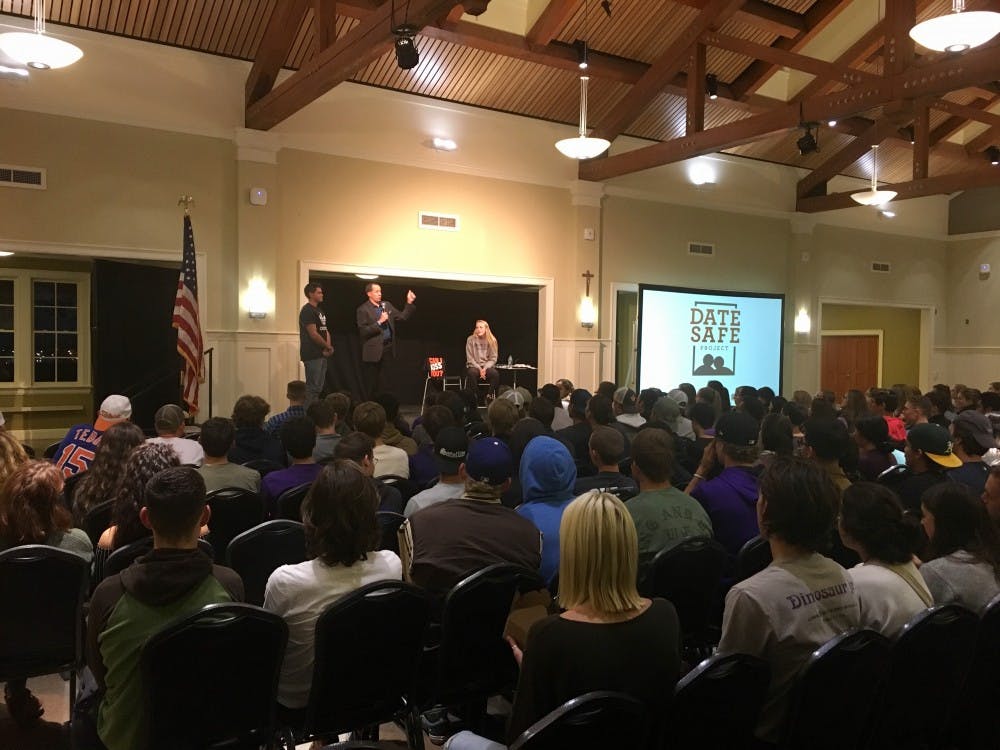In response to the controversy surrounding the Wally Awards last year, UP Athletics is making changes to its spring awards ceremony programming, including rebranding the Wallys and replacing the spring talent show with a community service day.
Instead of holding a talent show for student athletes, Athletics will hold a department community service day, according to Vice President of Athletics Scott Leykam. They will still hold an awards show, although it will not be called the Wally Awards.
The format will be changed “to create an environment and program that is more inclusive to all of our varsity programs and student athletes, ” Leykam said in an email. More details about the community service day and the awards show will be determined in the spring.
“It’s not going to be called the Wallys just for obvious reasons to try and take away the connotation from the event now, but there will still be an event that recognizes academic and athletic achievements,” Trent Mazelli, a senior track and field runner and the vice president of the Student Athlete Advisory Committee (SAAC) said.
These changes to the spring programming for Athletics are just some of several actions the department has taken to try to move past the uproar from last year's Wallys, which were draped in controversy because of controversial remarks made by emcee Goutham Sundaram, a tennis player who graduated in May.
The incident at the Wally’s last year shocked many and grabbed the attention of not just UP, but national media, as well. University President Fr. Mark Poorman, who attended the Wally’s last year and was criticized for his inaction, apologized twice for not saying anything at the event.
Sundaram didn’t walk at graduation and was taken off the team. Even ESPN anchor Hannah Storm referenced the incident in her commencement speech at the 2018 graduation last May. The incident was enough to prompt both athletics and Title IX to make some changes.
One of the several new changes athletics made this year includes more education for athletes regarding consent and Title IX. Athletics updated the syllabus for a required one-credit class for freshman student athletes called HPE 108: Life Skills for Student Athletes. The class includes lessons on sexual misconduct prevention, diversity and campus resources and policies.
This year, all varsity teams have had to meet with the Title IX team, the Department of Public Safety and the Green Dot project, and all athletes living on campus were required to attend the “Talk About It” meetings on Sept. 2. Leykam said that teams have had these meetings in the past, but this fall there has been an “extra focus” on them.
Athletics has also brought national speakers to campus to increase Title IX education among athletes. Nationally known speaker Mike Domitrz spoke at an event called “Can I Kiss You?” on Oct. 10 and discussed the dynamics of healthy and unhealthy relationships as well as how to ask for and recognize consent. Lynn Kachmarik, a former college coach at Bucknell University and athletic director at Saint Mary’s College, also spoke to SAAC, HPE 108 and senior staff about team culture and personal intervention.
The tennis team also had individual meetings with both Domitrz and Kachmarik.
The “Can I Kiss You?” event was one that stood out to some athletes as particularly effective in helping students better understand consent. Domitrz was engaging with the audience and made the athletes a part of the discussion. According to Mazelli, the event provided more insight and prompted athletes to discuss and share what they learned.
“I’ve definitely had athletes on the team talking about it,” Mazelli said. “Not spending time going over the issue, but talking about ‘Oh this is what happened from the event. I didn’t know this is what that meant. I didn’t know that’s how consent worked’.”
The “Can I Kiss You?” event was a chance for the athletes to engage and share what they learned, and to have another opportunity for education and engagement.
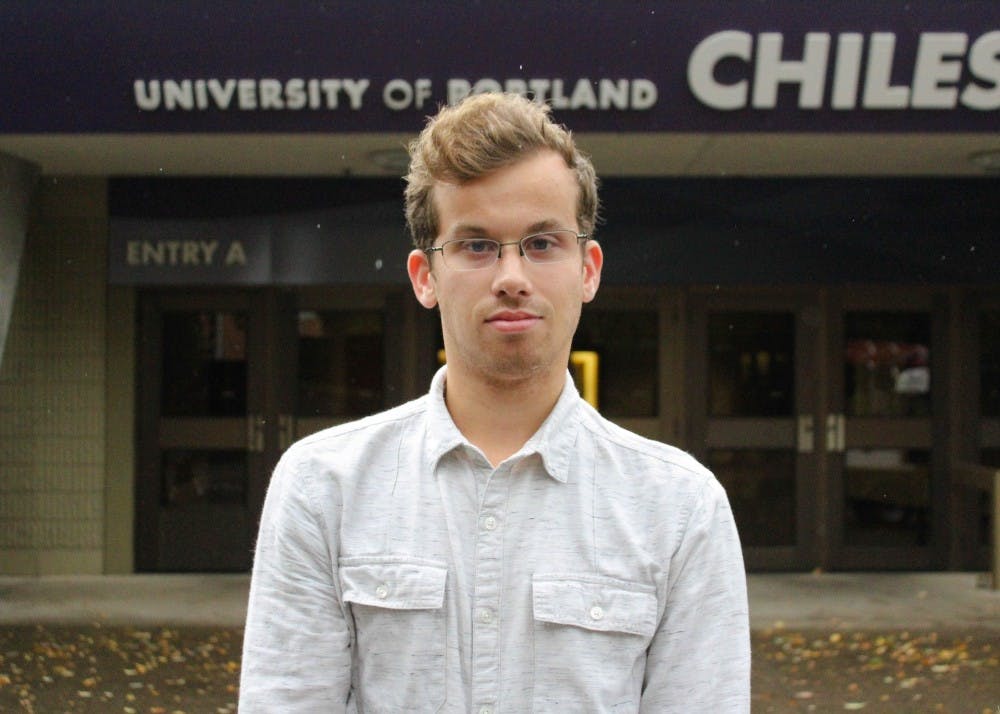
The Title IX team has also made some changes this year to help increase awareness and education of Title IX issues within athletics and on campus. These changes include adding more staff and updating the website to clarify Title IX policies and make it easier to navigate.
Title IX Coordinator for Education Matt Rygg pointed to the Talk About It sessions as a notable change in Title IX education. The talks were led by hall staff this September and focused on a variety of topics, including intoxication, consent and incapacitation. For Rygg, the hall directors’ enthusiasm taking on the task was important.
“The hall directors really wanted to play a central role in the education, which I was really pleased with,” said Rygg.
The Title IX meetings with each team have also intensified. In the past, the meetings would be quick, five-minute introductions to a Title IX coordinator. This fall, however, the meetings were about 45 minutes and went into greater detail about various topics. Instead of just introducing the Title IX coordinator, as it had been in years past according to Mazelli, they actually had a presentation about different issues such as sexual assault.
“It was kind of just a thing that I feel like people were listening to and then it was just over,” said sophomore basketball player Brian Smith. “This year we’ve been having more (education) which keeps you thinking.”
“It’s informing you, you’re learning about it,” Smith added. “It’s not just a one time thing where you’re just like ‘I don’t even remember what happened earlier in the year’.”

While some athletes found the extended meetings beneficial, others did not. Senior member of the rowing team Acacia Welsford felt that the meeting was too rigid, describing it as “like PR for a business” as opposed to a constructive conversation.
“It was very cold,” said Welsford. “(Teammates) were trying to challenge these professionals in the room by saying ‘well you’ve failed us before’. They responded in a very measured way, but not necessarily recognizing the humanity of Title IX.”
Junior rowing team member Amanda Hernandez-Michalski said she felt as if the questions they were asking weren’t being heard and that members of the Title IX staff were “beating around the bush” instead of honestly engaging with their questions.
Welsford expressed skepticism as to whether Poorman will follow through on his pledge to make the university a safer space, citing his inaction at The Wally’s as well as allowing Fr. Paul Scalia to speak on campus.
Scalia was criticized for his LGBTQ views and his speaking at the Red Mass prompted an ASUP-led protest. Public Affairs released a statement before the protest that said the university hopes to “foster a community that respects the differences and opinions of every student” and that they “appreciated ASUP’s goal to engage the community.”
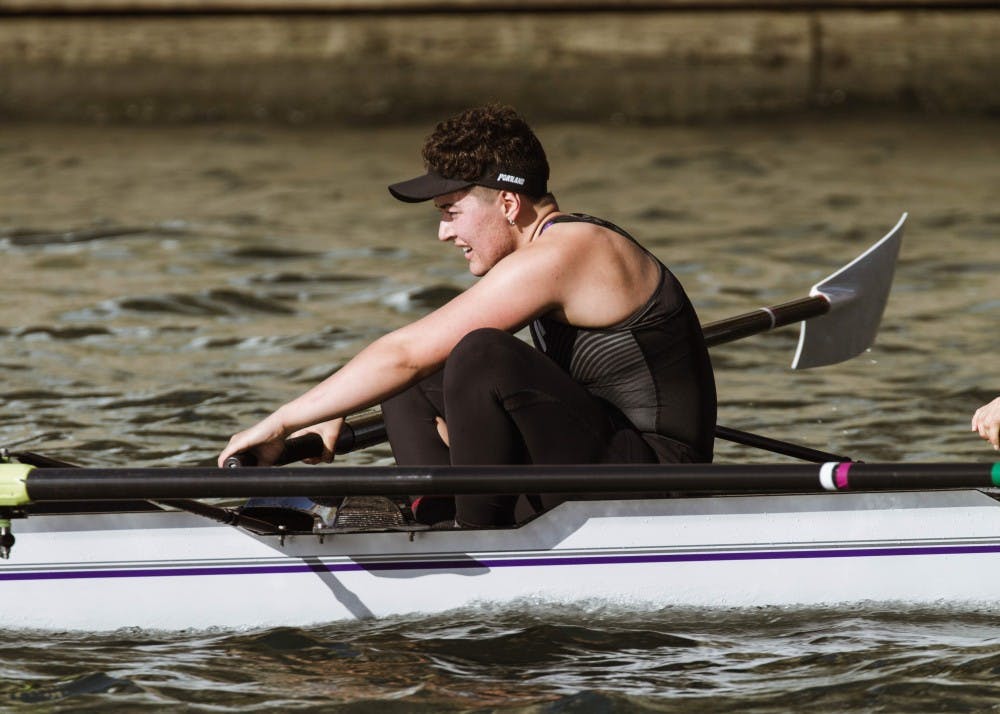
“I was there at The Wally’s when he didn’t stand up and say anything at all to stop the situation,” Welsford recalled. “I mean, on Monday (the week of the protest) the rowing team was having the meeting with the Title IX team saying ‘we’re gonna have a commitment to diversity and inclusion and safe spaces’ and by Wednesday the administration has invited a priest that speaks in favor of conversion therapy.”
Beyond the scope of just Title IX, athletics has also been increasing emphasis on community both with the campus and within the department itself.
Athletics has taken various steps towards making the department more integrated with the campus. The community service day is one way Athletics is trying to do that.
While the details are not completely ironed out yet, the plan is to tag on to student-run community service events taking place on campus, Mazelli said.
“It’s not like a specifically pre-planned event where this is all athletics is going to do,” Mazelli said. “It’s providing more opportunities and more things for people to do for community service.”
Both Mazelli and Welsford said that they have noticed a division among teams in their time here. The teams have tended to get wrapped up in a culture of comparison, and as Mazelli describes it, often stack accomplishments against one another. This year, Athletics wants to create a community that supports everyone’s accomplishments as wins for the school, not just the team.
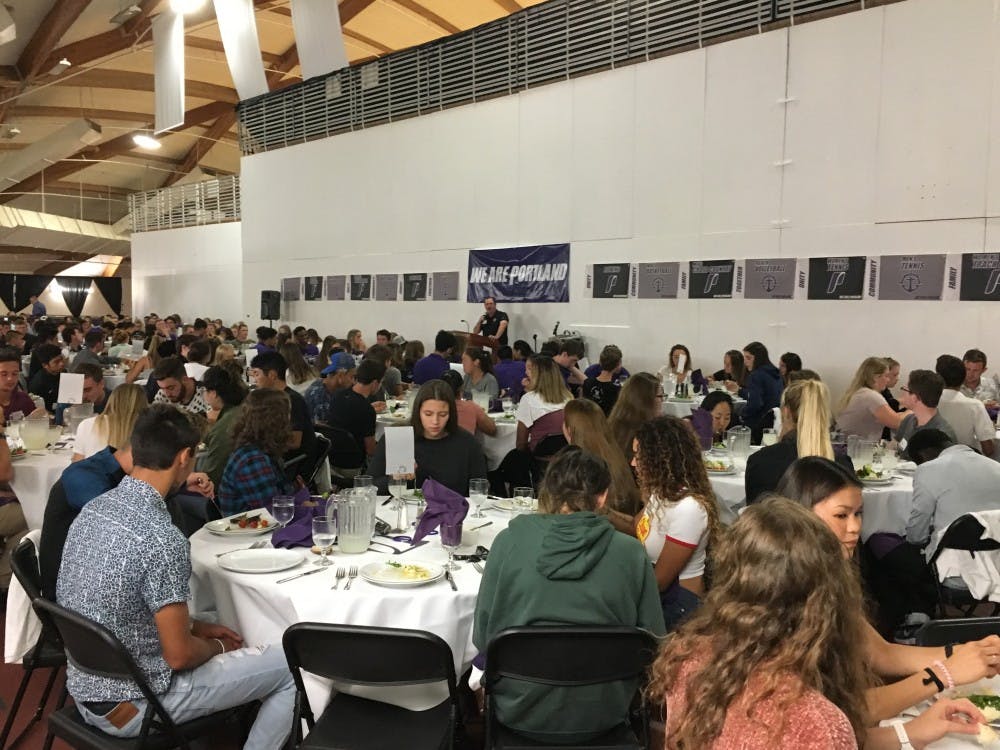
Mazelli and Smith pointed to the ‘We Are Portland’ dinner on Sept. 2 as an attempt from athletics to unite the teams. At the dinner, athletes and coaches were seated with members of other teams, interacting with them as opposed to isolating themselves. Most athletes saw it as an important first step in building the bonds athletics hopes for.
“I’ve noticed more and more athletes in the halls talking to each other,” said Mazelli. “More people communicating and hanging out, that type of stuff.”
The department is making a conscious effort to continue to grow, but in the end, Welsford and Hernandez-Michalski believe it’s not just up to the department to forge those bonds, but the athletes themselves to keep engaging with one another to build that community.
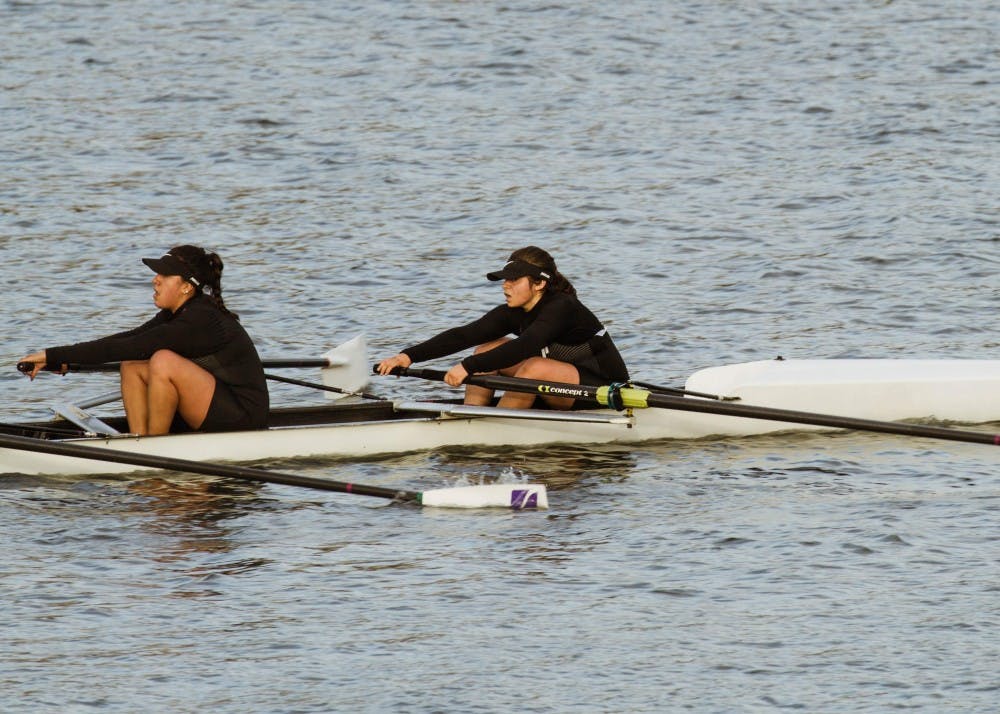
“I think that it comes down to the athletes themselves,” Welsford said. “It is ultimately up to the athletes if we’re going to have an integrative culture.”
“You have to put in the effort,” Hernandez-Michalski said. “You have to be conscious of the efforts that are being made and you can joke about it all you want but it just gets to a point where the jokes are old.”
Sundaram’s speech prompted a myriad of responses from a wide variety of people. Hernandez-Michalski wrote an opinion piece for The Beacon about the event, focusing specifically on how Sundaram’s exploitation of his parent’s immigration hurt her deeply.
The Wallys revealed for some, including Matt Rygg, a power imbalance on campus, opening up a wider problem that the university needed to address.
“It’s really shown the need to talk about these issues,” said Rygg. “Not just what is Title IX and what is sexual and gender based violence but why are these issues on campus, why is this an issue in society, what are the systems that are perpetuating this kind of conversation. And until we start to talk about the systems and the biases and the power structures these conversations and incidents will continue.”
To Rygg, this experience is one that showed that UP is not an exception to the power imbalances the world faces.
“Systems of oppression exist and the University of Portland is not immune to that,” Rygg said. “This is just one example of power and privilege that has gone unchecked and it was time for University of Portland to take an honest look at itself.”
It was enlightening to Leykam as well. During an interview with The Beacon, he pointed out a problem that not just the department but the conference and the NCAA need to address. The NCAA has faced Title IX issues in the past, including the recent scandal at Baylor University.
“It hit close to home,” Leykam said. “It’s definitely been something that’s being addressed at the NCAA level and the West Coast Conference level.”
For Leykam and Athletics, what they have done so far this fall has just laid the groundwork for more training to come.
“It’s not a short deal,” Leykam said. “It’s really just the start...If you ever say you solved the problem that means you stopped trying to learn.”
Kyle Garcia is the sports editor at The Beacon. He can be reached at garciaky20@up.edu.



